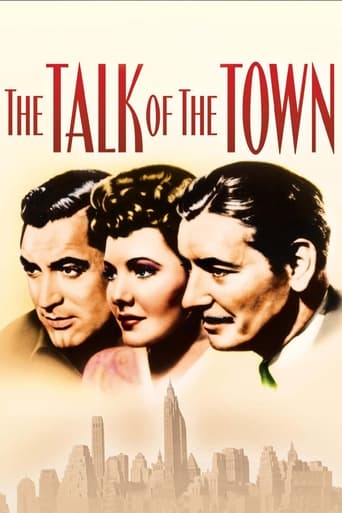SnoopyStyle
Mill worker Leopold Dilg (Cary Grant) is on trial for arson which burned down the mill and killed the foreman. He escapes and finds shelter in former schoolmate Nora Shelley (Jean Arthur)'s home. He injures his ankle and pleads his innocence. She's a schoolteacher who is renting out her home. Distinguished Harvard law professor Michael Lightcap (Ronald Colman) arrives at the same time planning to write a book. Dilg can't walk and Lightcap discovers Nora. Nora pretends to be in a fight with her mother. She enlists the help of lawyer Sam Yates. Socially conscious Dilg doesn't agree with Lightcap's views and has to challenge him. Nora passes him off as her gardener.The comedy strikes a very odd tone in a crime drama. It's just strange to have this slapstick fast-talking broad comedy while treating the arson murder case with deadly seriousness. It is very awkward and more importantly not funny. In the comedic moments, I wonder about the case. The professor is really pompous and dull. He's so charmless that the love triangle never really takes off. The discussions is heavy-handed and tiresome.
vleonica-44-795280
How does one pick their favorite Ronald Colman film; any film that contains a speech that he recites doubles it's pleasure for me. This particular is film is not only well written, as were most of Colman's films, but it has a strong plot & story which clearly defines the inner feelings of it's character's & their beliefs, which, and adding to that aspect, as it should be in real life, show that both, no matter how strong, not cast in stone. Adding even greater value are great performers, Jean Arthur, Cary Grant (who improved greatly as he matured,) and one of my favorite character actors, Edgar Buchanan who thoroughly & well play their parts to the utmost. Each is quite convincing in their role & this aspect follows through for all the actors. The film is superb in it's believability, the casting & direction, and every moment was & still is perfect, even the comedic relief is superb. And even today 72 years later, and after a multitude of personal viewings, this fine film holds it own. My god is this film that old, yikes. Well that just proves how great this film is. One never tires of it, & isn't the what proves it's worth. ;-)
Carl Ian Schwartz
Why were we fighting against he Axis? Until quite recently, this country stood for the rule of law. Under the guise of a love triangle, and scripted by Irwin Shaw, this wonderful film shows what America once stood for against the the caprice, injustice, and atrocity that characterized our enemies. As the plot unfolds, the rule of law and fact becomes clearer and ultimately prevails against fear manipulated through tainted journalism.There'a another film, released in England a year later, entitled "The Life and Death of Colonel Blimp." It's thesis is that you lose a war when you lose your national values and adopt those of your enemies.Frank Capra directed a major series of films during World War II--"Why We Fight." These two films put a personal, home-front slant on it.
jc-osms
Bit of a hotch-potch for me, this war-time George Stevens' production, though there was much to enjoy along the way. The problem for me was that I wasn't sure what kind of film it was trying to be - thriller, whodunit, romance, philosophical treatise, drama, even comedy and felt it fell between all these stools.It starts excellently with a grim, noirish introduction as Cary Grant's political agitant Leopoldo Dilg, a handy scapegoat effects a gritty, rain-soaked night-time escape from the accusing and chasing authorities when the munitions factory he works at goes up in flames, apparently killing the foreman. Then, however, it veers into farce with Grant's unwelcome stowaway routine at Jean Arthur's old place just happening to clash with soon-to-be-Supreme-Court-Justice Ronald Colman's tenancy of the place. Cue humorous comings and goings as Arthur attempts to conceal Grant, before she comes clean (sort of) with the cold, donnish Colman and introduces Grant to him as her surprisingly deep and free-thinking gardener, with whom Colman soon comes to converse on a highly intellectual and political level over games of chess. Later of course, both men influence each other's initially polarised point of view as we get to the predictable resolution with the romantic triangle between the three squared just as unsurprisingly too.The best parts of the film for me, were the cinematography and the acting of Grant and Arthur. I like Colman as an actor, but his part is poorly written as he's made out to be a sort of intellectual Longfellow Deeds come down from his ivory tower to get humanised by the vivacious Arthur and loquacious Grant. Comedy doesn't appear to be his forte, at least on this showing. The plotting is however too fantastical and muddled and escapes the director's attempts to pull it together coherently, to such an extent that I almost suspected studio tinkering with the left-leaning polemic of the piece.




